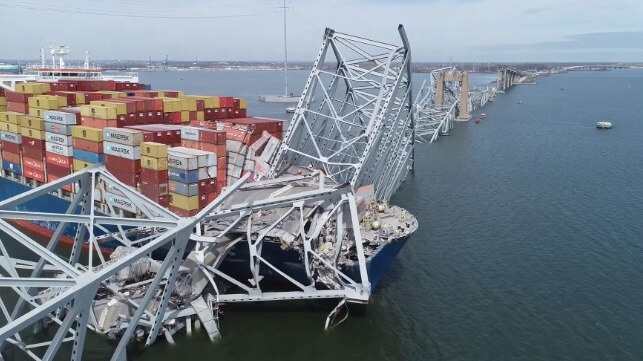Senior Maryland Pilot Warned Officials of Risk of Bridge Strike

A senior Maryland pilot raised concerns about the risk of an allision between a big ship and the Francis Scott Key Bridge at least as early as 2006, and continued to discuss the matter in local safety meetings for years, according to detailed records uncovered by the Washington Post. The documents also show that at the staff level, the Maryland Transportation Authority was aware that their bridge was "not designed to withstand collisions from large vessels," and that the cost of protecting it would be high.
Through requests and online sleuthing, the Post obtained copies of the meeting minutes for gatherings of the Baltimore Harbor Safety and Coordination Committee dating back two decades. This advisory committee is a quarterly gathering of representatives from the port's main stakeholders in industry and government, including the pilots' association, the Army Corps of Engineers, the Coast Guard, the port authority and state transportation officials.
The possibility of a ship hitting and damaging the bridge came up at least as early as 2004, when pilots' representative Capt. Joe Smith voiced concerns about the need for solid communications protocols in the event that a ship should go off course near the structure.
Two years later, in 2006, an engineer with the Maryland Transportation Authority (MTA) joined the safety committee meeting to talk about standards for protecting bridge piers from ship strikes. At that meeting, Capt. Smith "stressed the importance of bridge protection" and "noted that the agencies should be meeting and discussing implementation possibilities." No protection upgrades were planned, the engineer said, noting the high cost. He confirmed that the bridge piers were not designed to withstand a strike from a large, modern ship.

that matters most
Get the latest maritime news delivered to your inbox daily.
Smith continued to raise the matter of bridge protection for six more years, and the discussion frequently returned to the cost of the necessary upgrades. The line of discussion ended in 2014, shortly after Smith's retirement, according to the Post. The Key Bridge's limited protections were not upgraded, and former state officials told the paper that the matter was never discussed at a high level.
At the Delaware Memorial Bridge, 60 miles away on the same freeway system, a different agency reached a different conclusion. Delaware's bridge transport authority assessed that the risk of a catastrophic ship strike on the Memorial Bridge was too high, and it began planning a comprehensive pier protection system for the Memorial Bridge in 2015. With considerable political effort, it successfully got it funded through a bond measure and toll hike. Construction started on the eight protective steel-and-rock dolphins last year and should be done by 2025. The final cost will come to about $93 million; the cost of replacing Baltimore's Key Bridge is expected to run towards $2 billion.
